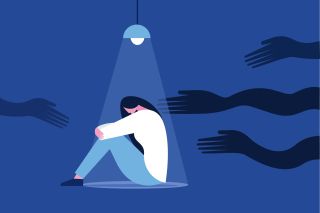Autism
The Tragic Truth About Sexual Abuse and Autism
A Personal Perspective: Why so many autistic women are victims of sexual abuse.
Posted March 26, 2024 Reviewed by Abigail Fagan

Recently, I sat with a group of autistic adults and saw a line in the sand. On many levels, it is a gender divide, but some men (amab) struggle with the issue as well. This line is sexual trauma. I have written about the overlap between posttraumatic stress disorder (PTSD) and autism before in more scientific and clinical terms but seeing this play out in reality and understanding the research are two different things. Research shows that 66% of autistic adults have PTSD and 91% of autistic females (afab) meet diagnostic criteria for PTSD. I can explain this in clinical terms, but it misses how profound it feels when you sit in a room with autistic adults talking about their trauma history.
Every woman (afab) in the room told different versions of the same story. They said adults their families trusted in childhood had attempted or succeeded in engaging them in sexual activity when they were very young. The autistic women didn’t fully understand how wrong the crimes against them were when they were children. They knew the crimes made them unhappy and uncomfortable. Usually, when they tried to explain what happened to the other adults in their life they were reprimanded, so the abuse had continued because they had no ability to understand it or communicate they needed help.
All of the autistic women in the room had been sexually abused as girls. Since we didn’t understand what normal was, we didn’t understand the depth of the crime that was being committed against us. We all knew we hated it. We all knew we didn’t like it, but as autistic children, we are forced to do many things we hate. We are forced to eat food we hate. We are forced to go places that are too bright, too loud, too uncomfortable and we are told we are being difficult if we complain. Autistic children are taught that our complaints are ridiculous and that it is abnormal to be uncomfortable. As children, the crimes committed against us seemed like just another horrible thing we were being asked to do by adults. Most of us tried to communicate what happened to the other adults in our life but we were ignored or unable to communicate it because we weren’t good at communicating or we perceived as overly emotional.
There are men this happened to as well. I listen to these stories day in and day out in my practice, in groups, at events, and in online discussions and over and over again it breaks my heart. Autistic children are easy prey for sexual predators in family systems and in the community. We are lonely. We crave any attention that isn’t focused on all the behaviors we are doing wrong. We don’t know what normal is. We are used to being forced to do things that make us physically uncomfortable. We are chastised all the time for complaining about having our physical needs and wants violated. People don’t listen to us. We struggle to communicate. We are isolated. Weird behavior isn’t noted in us because we are "weird" to begin with.
So if you sit in a room with autistic women, you will find that almost all of us have been victims of multiple sex crimes. This trend drifts into adulthood When autistic adult women begin seeking out adult romantic partners they become easy targets again. Since we are unable to read social cues, we don’t see many of the red flags neurotypical people see. We often don’t have groups of female friends to guide us. Again, we are used to being told our behavior is weird, wrong, and needs correcting so we are easily gaslit. We lack the ability to recognize danger in humans in general and even as adults, we often don’t even realize a crime has been committed against us until long after it has occurred.
For me, I have spent my entire life trying to say no and set boundaries with numerous simple things. I tell people that the grocery store is overwhelming, and it causes me to melt down after departure and people tell me I need to learn coping skills and that I am using my autism as an excuse for bad behavior. I tell people I don’t eat vegetables and people tell me that is unacceptable, and I need vegetables no matter how much I hate them and I need to learn to be more tolerant. I tell people no to loud noises and I have been told my entire life I am too sensitive. I tell people I can’t do so many things and they say I am being rude, mean, insensitive, or too weak. Saying the word “no” has never held any meaning to anyone around me and I have been trained to ignore all my inner cues and trust the normal people around me to know what is best for me since I was a child. Why would I think it was odd for a man to ignore my requests for him to stop unwanted sexual activity and later try to convince me it was what was best for me?
As we move into April and into autism awareness month, I think it is important to not just look at ways to force autistic people to violate their boundaries to blend in with neurotypical society but to focus on finding ways to begin respecting autistic people’s boundaries so they can learn that their voice and needs and wants matter as much as any neurotypcal’s.
References
Haruvi-Lamdan, Nirit, Horesh, Shani Zohar, Kraus, Meital, & Golan, Ofer (2020). Autism spectrum disorder and post-traumatic stress disorder: An unexplored co-occurence of conditions. Autism 24 (4). 884-898
Leedham, Alexandra, Thompson, Andrew, R. Smith, Richard, & Freeth, Megan. (2019). 'I was exhausted trying to figure it out': The experiences of females receiving an autism diagnosis in middle to late adulthood. Autism.
Reuben, Katherine E., Stanzione, Christopher M, & Singleton, Jennifer L (2021). Interpersonal trauma and posttraumatic stress in autistic adults. Autism in Adulthood 3 (3), 247-256.


